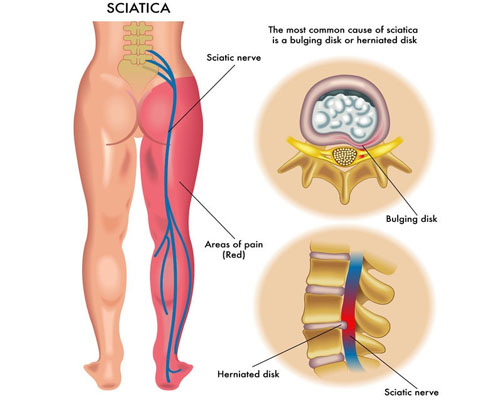Sciatica & Herniated Disc Treatment
Our spine consists of the vertebral column through which spinal cord runs. From the spinal cord various nerves comes out and supply sensations to the peripheral parts of the body. Sciatic nerve is large nerve that runs from the lower back down the back of each leg. When something injures or puts pressure on the sciatic nerve, it can cause pain in the lower back that spreads to the hip, buttocks, and leg. Up to 90% of people recover from sciatica without surgery. In brief, Sciatica refers to back pain caused by a problem with the sciatic nerve.
Symptoms of Sciatica
- Lower back pain
- Many a times pain extends through the hip and buttock and down one leg
- Usually on one side
- Usually worse when you sit, cough, or sneeze
- The leg may also feel numb, weak, or tingly at times.
- The symptoms may remain for few days to weeks, but the good news is that pain subsides in 95% of cases with conservative treatments and pain management procedures.

How to differentiate sciatica from other causes of back pain?
Not all back pain are sciatica. Every individual in their life time suffers from back pain. As per literature up to 85% of Americans experience some type of back pain during their lives. But this doesn’t always involve the sciatic nerve. Muscle and ligament sprain and strain are common reason of back pain. One of the easiest character to differentiate these pain from sciatica pain is – In Sciatica, pain radiates to leg and / or foot (Shooting, shock like, cramp like or aching) in one particular band.
Who Gets Sciatica?
- Age 30-50
- Females during pregnancy (pressure on sciatic nerve) from full size uterus
- Commonest cause is a herniated or slipped disc and degenerative arthritis of the spine
What causes Sciatica?
- Herniated Disc –
The most common cause of sciatica is a herniated disc (also called as slipped disc). Discs act like cushions between the vertebrae of your spine. It acts as a shock absorber. Aging makes these discs weaker. They are easy to get damaged by minor injuries. Herniated disc means the central gel leaks out and compress the sciatic nerve. About 1 in 50 people will get a herniated disc at some point in life.
- Spinal Stenosis –
Aging, minor repeated injuries over time causes natural wear and tear of the disc can lead to a narrowing of the spinal canal. This narrowing, called spinal stenosis may put pressure on the roots of the sciatic nerve. Spinal stenosis is more common in adults over age 60.
- Spinal Tumors –
In rare cases, sciatica may result from tumors growing inside or along the spinal cord or sciatic nerve. As a tumor grows, it may put pressure on the nerves that branch off from the spinal cord.
- Piriformis Syndrome –
The piriformis is a muscle found deep inside the buttocks Sciatic nerve runs between 2 heads of the muscle belly. If this muscle goes into spasm, it can put pressure on the sciatic nerve, triggering symptoms of sciatica. Usually women suffer more from this syndrome. Keeping a fat wallet in the back pocket may also cause piriformis syndrome (FAT WALLET SYNDROME).
- Sacroiliitis –
Sacroiliitis is an inflammation of one or both of the sacroiliac joints. Sacroiliac joint is a joint between sacrum and hip bone ilium. It causes pain in the buttocks, lower back, and may even extend down one or both legs. The pain is more on prolonged standing or climbing stairs. Sacroiliitis can be caused by arthritis, injury, pregnancy, or infection.
- Injury or Infection –
Other causes of sciatica include muscle inflammation, infection, or injury, such as a fracture. In general, any condition that irritates or compresses the sciatic nerve can trigger symptoms. In some cases, no specific cause of sciatica can be found.
Treatments for sciatica
- Ice and Heat –
- Medication –
- Physiotherapy –
- Pain Management injection –
- Surgery –
- Rehabilitation therapy –



